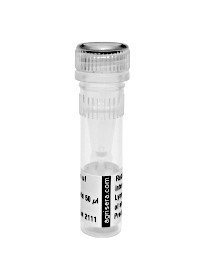1

Anti-BoNT-E | Botulinum neurotoxin E, light chain (Biotin conjugated)
AS21 4699 | Clonality: Polyclonal | Host: Chicken | Reactivity: Botulinum neurotoxin E
- Product Info
-
Immunogen: Recombinant Botulinum Neurotoxin Type E Light Chain (Clostridium botulinum). Host: Chicken Clonality: Polyclonal Purity: Immunogen affinity purified in PBS; pH 7.2. Contains 50% glycerol with 0.1% 2-chloroacetamide. Format: Liquid Quantity: 0.1 mg Storage: Antibody should be stored at -20°C.Aliquote to avoid repeated freeze-thaw cycles. Please remember to spin the tubes briefly prior to opening them to avoid any losses that might occur from material adhering to the cap or sides of the tube. Tested applications: ELISA (ELISA), Western Blot (WB) Recommended dilution: To be determined by the end user. - Reactivity
-
Confirmed reactivity: Clostridium botulinum Not reactive in: No confirmed exceptions from predicted reactivity are currently known - Background
-
Background: Botulinum toxin is a toxin produced by the anaerobic, gram-positive, bacterium of the genus Clostridium (C. botulinum, C. butyricum, C. baratii and C. argentinense). These strains are widely distributed and can be found in soil and dust. Eight types of botulinum toxin are distinguished, named type A–H. Type A and B are capable of causing disease in humans (botulism) and have longest activity in vivo, and are also used commercially (BOTOX) and medically. Types C–G are less common; types E and F can cause disease in humans, while the other types cause disease in other animals. Type E is a cause of botulism in humans. BotE is cleaved into two chains: heavy and light.
Alternative names: Bontoxilysin-E, BoNT, BotE, - Protocols
- Antibody protocols
- Reviews:
-
This product doesn't have any reviews.

